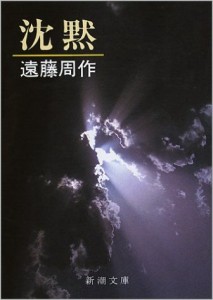 (chinmoku Endo Shusaku)
(chinmoku Endo Shusaku)
A Jesuit priest from Portugal named Rodrigo who came to the Nagasaki area undercover near the beginning of the ban of Christianity in the early 17th century. The book has a heavy tone the whole way through with no moments of comic relief. Although I usually like lighter novels this one was worth reading. As a Christian, I’m interested in knowing how Christianity is perceived in Japan. Japan has a Christian population of only 1 percent, but this book comes up on most lists of post-war literature everyone should read, and Endo Shusaku was even a candidate for the Nobel prize in literature. So, I imagine this book has some influence on what people in Japan think about Christianity and Jesus.
There was a lot of imagery about bugs to keep the mood dark. Two instances that stand out are when Ferreira describes Christianity in Japan as a butterfly caught in a spider web, and when Rodrigo compares the pleasure he gets from squishing lice in his clothing to the feeling that security officials get as they are killing Christians.
Rodrigo turns out to be a Christ figure. Parallel to the way Jesus left heaven to come to earth and gave up everything for humanity by dying on the cross, Rodrigo gives up everything by coming to Japan and committing surface level apostasy, which strips him of any association with the church, to save Japanese Christians from painful execution. Also, Rodrigo’s internal struggles are covered in detail, and it is interesting watching his relationship with Jesus evolve as he moves through different trials.
This wasn’t as challenging to read as I thought it may be, but there were a few aspects that were quite challenging. The local dialect was impossible for me to understand, but was usually clear from context. The quotes from the Bible are in a challenging style, but I was able to recognize the passages and rely on previous understanding. I couldn’t read the last chapter at all, but I found I wasn’t the only one. I was able to get the summary from someone’s answer on Yahoo’s Chiebukuro.
This book was very heavy and dark, but it’s worth reading to get an idea of what the early 1600’s in Japan must have been like for Christians, and to understand Rodrigo’s faith and decisions as he goes through unbelievable trials.
